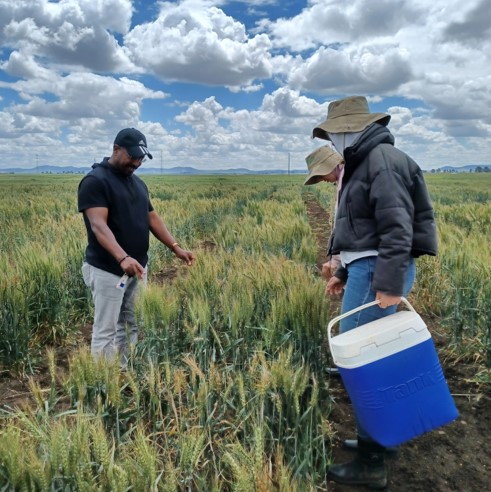Landing in Morocco

Salam! My name is Sarah and during the spring semester I had the opportunity to complete research in Morocco thanks to the ACES Global Food Security grant. I was excited to conduct research in Rabat, Morocco, focused on improving food security in arid countries. My goals are further motivated by climate change, as it contributes to the creation of more extreme weather events and conditions.
I think the biggest takeaway I have is an appreciation for cultures vastly different than my own. For some reason I didn’t expect research or academia to be different, just daily life. I was wrong in this assumption and have realized that culture impacts every component of the society on which it is built.
I am currently a master’s candidate in the Lipka Lab where I study genotype by environment interactions (GxE). When I saw the call for applications to the ACES International Food Security Application, I started searching for potential collaborators and through fellow students, Joyce and Milik, was introduced to Dr. Udupa a senior researcher at the International Center for Agriculture Research in the Dry Areas (ICARDA), stationed in Morocco. Together, we designed a project utilizing ICARDA’s field trial data to optimizing genomic prediction in arid food crops using GxE by management analysis. In October I was notified that our application was accepted and began research.
As COVID made travel challenging, my timeline for visiting ICARDA in Morocco shifted several times. The delays allowed more time for preliminary research and planning. I was lucky enough to be one of the first people back in the country. Morocco was just getting out of another lockdown. Traveling within COVID itself created a whole additional level of complexity. Between trying to time out PCR tests and make sure the proper paperwork was in order, the flights into Morocco were stressful. Thankfully, I safely arrived in country and hit the ground running.
I made it to ICARDA in February, which is where I worked on research until late April. It was incredible to work in-person with the ICARDA scientists who focus on arid crops and face challenges that are entirely different to those we face in the United States. It was instrumental to see how data are collected and recorded firsthand and to visit the fields and talk to the field hands about their management practices. Getting to be hands-on in this climate was insightful. This year, there is a drought in Morocco, which is taking many fields past wilting point, leading to both severe plant and yield loss. Because of this, data collection for some fields is entirely impossible.
After a team strategy session, we decided to remove chickpeas from our trial and focus on wheat. The value I gained by visiting Morocco is a deeper understanding of the difficulties growers face daily. Difficulties that will only amplify due to the environmental crisis of climate change. I now have a clearer idea of what my future work should focus on to maximize food security in arid regions. I am hopeful that this project will equip plant breeders to accelerate the genomic prediction efforts by allowing for improved and drought resistant seed varieties to be released to growers more rapidly.
I was lucky to be in Morocco over Ramadan which allowed me to participate in the fasting and feasting rituals. The month-long holiday impacted many things including the time zone, working hours, and work capacity. It took my body some time to adjust to the fasting with my peers as water, gum, and even Chapstick are not allowed during the day. Once the mosque loudspeakers announce sundown my favorite part of the day, Iftar, a period of feasting begins. There are many dishes that are special to Ramadan and these late-night meals.
I enjoyed many Iftars with my colleagues at ICARDA and local families where I learned more about the culture and customs.
I am so grateful for the opportunity to work with my collaborators in person as it allowed me to better understand how they went about collecting data and how they as a group interact. I believe my project will have a richer perspective as it draws from the strengths and opinions of two strikingly different cultural contexts.
The Office of International Programs has initiated the Global Food Security Graduate Fellowship Program to support exceptional ACES graduate students who are interested in conducting research in a developing country, in collaboration with a mentor from an International Agricultural Research Center in the Consultative Group for International Agricultural Research or a national research institute devoted to food and agricultural issues. Sarah was awarded a 2021 Fellowship for her project “Optimizing genomic prediction in wheat and chickpea for environment and management practices in extreme environments.” She is a graduate student in the Department of Crop Sciences advised by Alex Lipka.